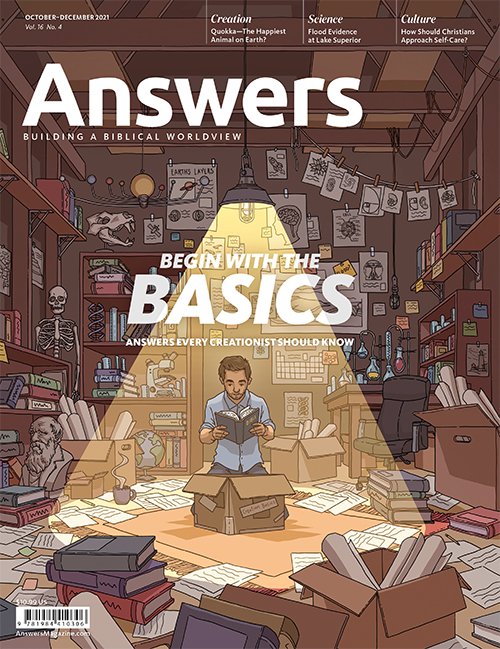Quokka: The Happiest Animal on Earth?
Even the cutest critter reminds us that we live in a fallen world.
Be honest—you’ve probably watched at least one cat video on the internet. If you’re not careful, you may be shocked (and a little embarrassed, three hours later) when you realize what time it is! We can get a lot of laughs from watching the comical things cats do. How is it that cat videos have become so popular? Both smiles and laughter release endorphins that make us feel good.
Funny felines might be the cat’s meow nowadays, but in the 2010s a different viral trend took the internet by storm: quokka selfies. You might be wondering, “What in the world is a quokka, and why would anyone want to take a selfie with one?” This housecat-size relative of the kangaroo is a short-tailed scrub wallaby, but Australians know it as the quokka. Quokkas are adorable creatures that always look like they are smiling. Why would you not want to take a selfie with one?

But what gives the quokka this permanently plastered pleased appearance? Quokkas are mammals, and as such, have facial muscles that allow for different expressions. Mammals are the only animals capable of facial expression. (Think about it: have you ever seen a gecko grin or a frog frown?) When they pant, quokkas appear to smile. Due to their facial muscles, unique face shape, and lack of fear around humans, quokkas have often been called “the happiest animal on earth.” But don’t be fooled by their adorable smile. Even the “happiest” animal reminds us that we live in a fallen world tainted by sin and the curse.
Kind of Adorable
The quokka belongs to the family Macropodidae, or the kangaroo kind, along with its relatives, kangaroos and other wallabies. In Genesis 1, we learn that God created living things to reproduce after their own kind. The word kind is how God has chosen to classify living organisms in the Bible. In modern taxonomy, kind most often lines up with the family level of classification. Most of the members within a kind are capable of mating together and producing offspring, so the kind is a reproductive unit.
When God created the original animal kinds, he created a male and female of each kind. He didn’t need to create quokkas, red kangaroos, gray kangaroos, wallabies, and the rest. Instead, he built into the original kangaroo kind enough genetic diversity to give us the different species that we see today—including the adorable quokka.

Quokkas inhabit a small region of the Southwest Australia mainland and Bald Island off the coast of Western Australia.
One of the largest quokka populations is found on Rottnest Island, just off the coast near Perth, Australia.
Survival of the Cutest
Like its kangaroo counterparts, the quokka is a marsupial that gives birth to extremely small young called joeys. A joey is about the size of a bean. It is blind and hairless and not fully developed at birth. But God designed the joey’s forelimbs and shoulders to be more developed than the rest of its body so that right after birth it has the strength to climb up to the mother’s pouch where it grows and finishes developing. Without this design, the quokka wouldn’t exist. God endowed them with this ability from the beginning of creation so that they could be fruitful and multiply. How many evolutionary dead ends would have to occur before evolution finally hit upon the correct development and timing to allow for the survival of the loveable quokka?
Not-So-Pretty Parenting
While the quokka may look cute and cuddly, its smile belies a perfect life. Living in an imperfect world, where predators don’t care how cute their prey is, a quokka will do whatever it takes to survive. When a female quokka carrying a joey is being pursued, she may intentionally drop her baby in her attempt to escape. As an easy meal, the joey distracts the predator, allowing the mom to get away. This sad and sobering behavior isn’t what God intended in his perfect creation. Before the fall, God commanded that all living things eat plants (Genesis 1:29–30). After Adam and Eve sinned, everything changed.
A Remnant of Beauty
Despite nature’s dark side, creation contains many things that can make us smile.
Despite nature’s dark side, creation still contains many things that can make us smile, from crazy cats to cute quokkas. Proverbs 17:22 (KJV) says, “A merry heart doeth good like a medicine.” So take a lesson from the quokka and smile more—you’ll make other people smile too.
Quokkas are still under the effects of sin and the curse, as we all are. Yet their smile and amazing design shows us that, even in our fallen world, there is still a remnant of beauty that points to the goodness of our Creator, Jesus Christ. And in his goodness, he is coming back to restore everything to its perfect condition as it was before the fall. Now that is something to smile about!
Did You Know . . .
- Over the centuries, quokkas have been mistaken as cats and even as large rats.
- A quokka’s tail has very little hair and looks like a large rat tail.
- Quokkas have a curved femur which decreases strain during movement.
- Quokkas are nocturnal and usually spend the day sleeping or relaxing in the shade.
- “Rottnest” is Dutch for rat’s nest. The explorers who first encountered Rottnest Island, just off the Australian coast near Perth, thought quokkas were large rats and gave the island its name.
- The quokka is listed as vulnerable (population decreasing, but not yet endangered) on the International Union for Conservation of Nature Red List of Threatened Species.
Answers Magazine
October–December 2021
Curious about creation but don’t know where to start? Let’s begin with the basics.
Browse IssueRecommended Resources

Answers in Genesis is an apologetics ministry, dedicated to helping Christians defend their faith and proclaim the good news of Jesus Christ.
- Customer Service 800.778.3390
- Available Monday–Friday | 9 AM–5 PM ET
- © 2026 Answers in Genesis





